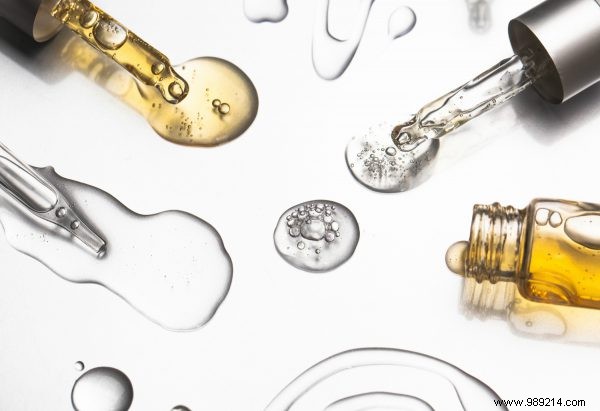
Skin-enhancing acids are indispensable for a healthy and even complexion. But one acid is not the other. Here are the differences and here's what they can do for your skin.
Helps with:blemishes, dull complexion, oily skin
Salicylic acid is the acid against oily skin with impurities. You often find the ingredient in purifying products that fight acne and pimples. Vivian Heemskerk is a skin therapist and works daily with acids in her practice VIVE Skin Therapy. She says:“Research shows that salicylic acid dissolves sebum deep into the pores and removes dead skin cells. This makes the acid suitable for impure skin.” Salicylic acid acts as an exfoliant:it dissolves dead skin cells and thus ensures a fresh complexion.
Read also: ‘You probably already have these 6 natural remedies for skin problems at home‘
Helps with:dull complexion, pigmentation spots, dry skin
In the group of fruit acids we find glycolic acid. This exfoliating acid allows new, healthy skin cells to surface, reducing the chance of impurities and giving skin a healthy glow. Heemskerk:“Glycolic acid is an asset to every skin. As you get older, the skin needs extra help to remove dead skin cells.” In addition, glycolic acid has a moisture-binding effect, and research shows that it makes pigmentation spots less visible and prevents sun damage.
Helps with:pigmentation spots, UV damage, skin aging
The purest form of vitamin C falls into the acid category:ascorbic acid. This is responsible for the production of collagen, helps limit UV damage and can reduce pigmentation spots. By regularly lubricating with a high dose, you inhibit the production of melanin in the skin. This way you prevent pigmentation and the skin remains more even. A disadvantage of ascorbic acid is that it is very unstable. As soon as it comes into contact with water, it loses its effect. Therefore, it is preferable to choose a product with ascorbic acid without water.
Helps with:dull complexion, impurities, sensitive skin, dry skin
Lactic acid falls into the same group of exfoliating acids as glycolic acid, but it is milder on the skin. This makes it a nice acid for sensitive skin. The most striking property of lactic acid:it stimulates the production of hyaluronic acid in the deeper layers of the skin. And because hyaluronic acid binds moisture, lactic acid works wonders for dehydrated skin. Skin therapists often use lactic acid for skin problems such as eczema and rosacea, because the acid kills organisms that can cause these skin complaints.
Helps with:skin aging, impurities, pigmentation spots
Vitamin A acid is the most effective acid against acne and skin aging. It is only available with a doctor's prescription and that's a good thing:vitamin A acid comes with a manual and can cause irritation. Heemskerk:“Milder alternatives are retinaldehyde, retinol derivatives and retinol. They are less effective:you need a higher concentration for the same effect.” Vitamin A acid and retinol inhibit the breakdown of collagen, stimulate the production of collagen and elastin and are powerful for pigmentation spots and acne.
Acids can give you a beautiful, younger skin, if the concentration is high enough. Check the vial for the percentage or see if the acid is at the top of the ingredients list. The lower on the list, the less of the acid is present in the product.
Now from €1.99
To the digital kiosk